Psychology 14: Counselling in the Health Professions - Williams Family
VerifiedAdded on 2022/08/14
|14
|4016
|19
Report
AI Summary
This report analyzes a case study of the Williams family, addressing issues of financial stress, alcohol addiction, Asperger's syndrome, and behavioral problems in the children. The report proposes a community counseling approach, suggesting Cognitive Behavioral Therapy (CBT) for the father's alcoholism, Functional Family Therapy (FFT) for the younger son's behavioral issues, and psychoeducation for the elder son with Asperger’s. Additionally, Marriage and Family Therapy (MFT) is recommended to resolve marital conflicts. The report emphasizes the importance of personalized treatment plans and the need for additional referrals to services such as Alcoholics Anonymous and financial advisors. The best practices involve engaging all family members in therapy to improve communication, resolve conflicts, and support each individual's needs, ultimately aiming for family well-being and effective coping mechanisms.

Running head: PSYCHOLOGY 1
Counselling in the health professions
Name of the Student
Name of the University
Author Note
Counselling in the health professions
Name of the Student
Name of the University
Author Note
Paraphrase This Document
Need a fresh take? Get an instant paraphrase of this document with our AI Paraphraser
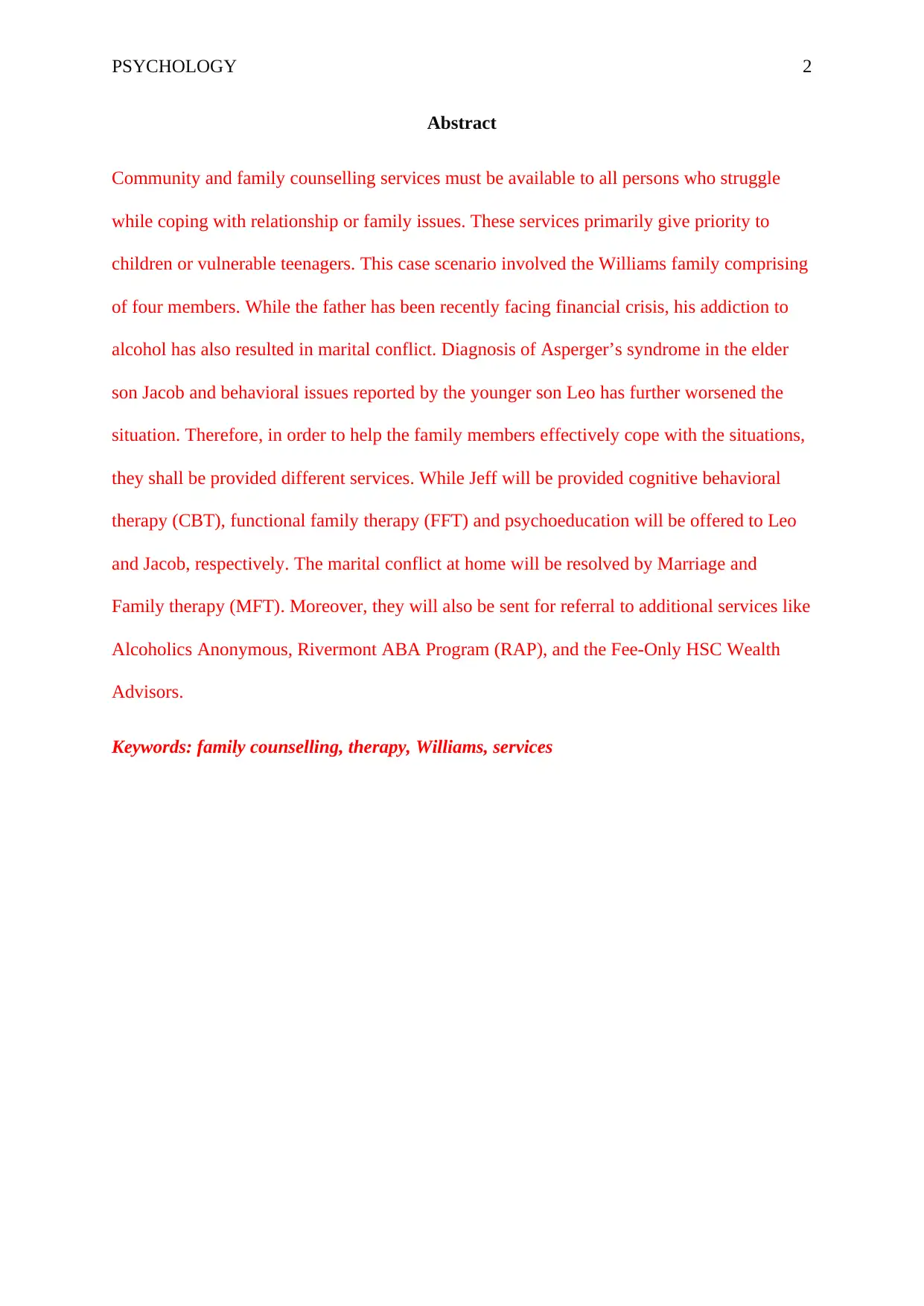
PSYCHOLOGY 2
Abstract
Community and family counselling services must be available to all persons who struggle
while coping with relationship or family issues. These services primarily give priority to
children or vulnerable teenagers. This case scenario involved the Williams family comprising
of four members. While the father has been recently facing financial crisis, his addiction to
alcohol has also resulted in marital conflict. Diagnosis of Asperger’s syndrome in the elder
son Jacob and behavioral issues reported by the younger son Leo has further worsened the
situation. Therefore, in order to help the family members effectively cope with the situations,
they shall be provided different services. While Jeff will be provided cognitive behavioral
therapy (CBT), functional family therapy (FFT) and psychoeducation will be offered to Leo
and Jacob, respectively. The marital conflict at home will be resolved by Marriage and
Family therapy (MFT). Moreover, they will also be sent for referral to additional services like
Alcoholics Anonymous, Rivermont ABA Program (RAP), and the Fee-Only HSC Wealth
Advisors.
Keywords: family counselling, therapy, Williams, services
Abstract
Community and family counselling services must be available to all persons who struggle
while coping with relationship or family issues. These services primarily give priority to
children or vulnerable teenagers. This case scenario involved the Williams family comprising
of four members. While the father has been recently facing financial crisis, his addiction to
alcohol has also resulted in marital conflict. Diagnosis of Asperger’s syndrome in the elder
son Jacob and behavioral issues reported by the younger son Leo has further worsened the
situation. Therefore, in order to help the family members effectively cope with the situations,
they shall be provided different services. While Jeff will be provided cognitive behavioral
therapy (CBT), functional family therapy (FFT) and psychoeducation will be offered to Leo
and Jacob, respectively. The marital conflict at home will be resolved by Marriage and
Family therapy (MFT). Moreover, they will also be sent for referral to additional services like
Alcoholics Anonymous, Rivermont ABA Program (RAP), and the Fee-Only HSC Wealth
Advisors.
Keywords: family counselling, therapy, Williams, services
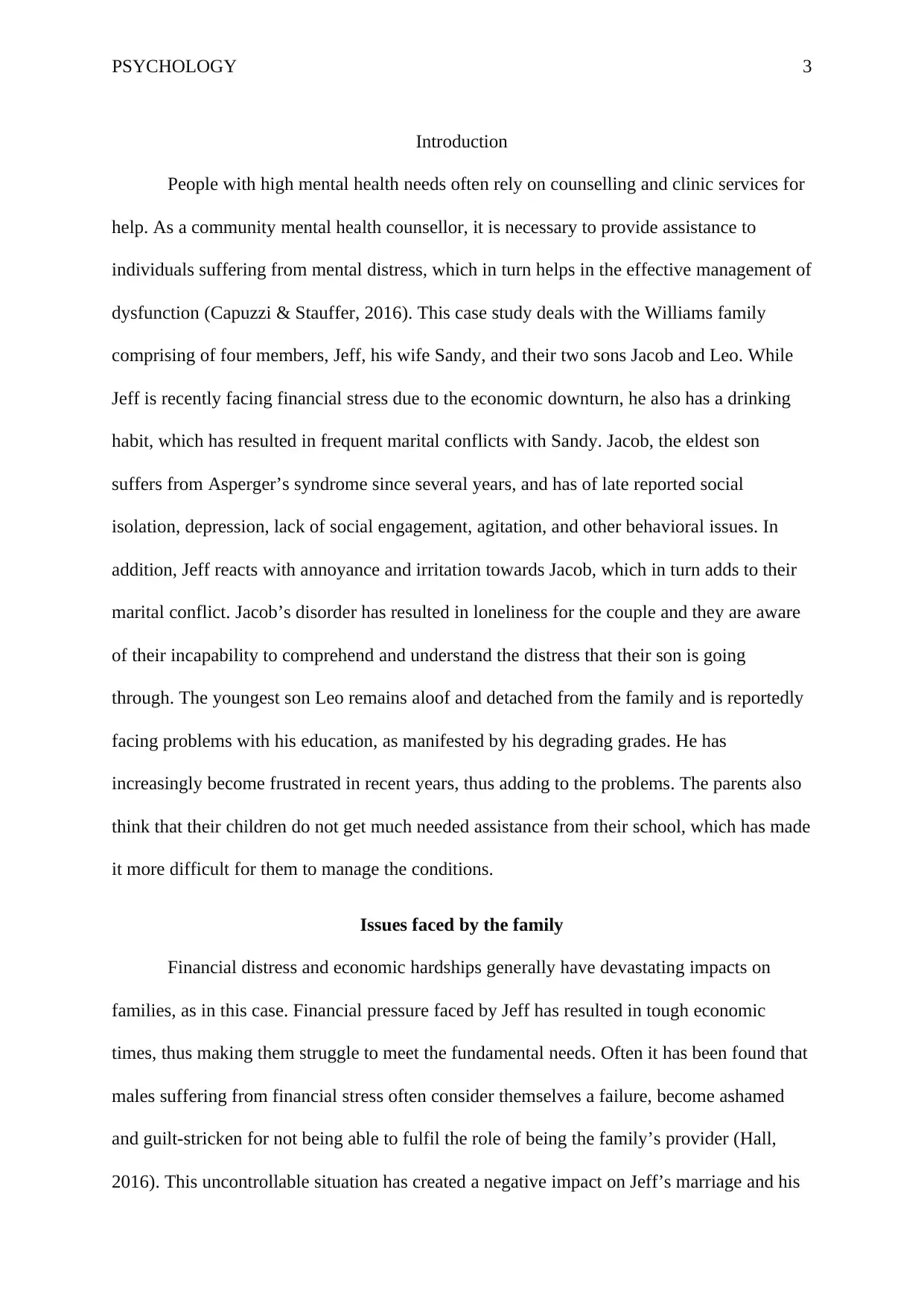
PSYCHOLOGY 3
Introduction
People with high mental health needs often rely on counselling and clinic services for
help. As a community mental health counsellor, it is necessary to provide assistance to
individuals suffering from mental distress, which in turn helps in the effective management of
dysfunction (Capuzzi & Stauffer, 2016). This case study deals with the Williams family
comprising of four members, Jeff, his wife Sandy, and their two sons Jacob and Leo. While
Jeff is recently facing financial stress due to the economic downturn, he also has a drinking
habit, which has resulted in frequent marital conflicts with Sandy. Jacob, the eldest son
suffers from Asperger’s syndrome since several years, and has of late reported social
isolation, depression, lack of social engagement, agitation, and other behavioral issues. In
addition, Jeff reacts with annoyance and irritation towards Jacob, which in turn adds to their
marital conflict. Jacob’s disorder has resulted in loneliness for the couple and they are aware
of their incapability to comprehend and understand the distress that their son is going
through. The youngest son Leo remains aloof and detached from the family and is reportedly
facing problems with his education, as manifested by his degrading grades. He has
increasingly become frustrated in recent years, thus adding to the problems. The parents also
think that their children do not get much needed assistance from their school, which has made
it more difficult for them to manage the conditions.
Issues faced by the family
Financial distress and economic hardships generally have devastating impacts on
families, as in this case. Financial pressure faced by Jeff has resulted in tough economic
times, thus making them struggle to meet the fundamental needs. Often it has been found that
males suffering from financial stress often consider themselves a failure, become ashamed
and guilt-stricken for not being able to fulfil the role of being the family’s provider (Hall,
2016). This uncontrollable situation has created a negative impact on Jeff’s marriage and his
Introduction
People with high mental health needs often rely on counselling and clinic services for
help. As a community mental health counsellor, it is necessary to provide assistance to
individuals suffering from mental distress, which in turn helps in the effective management of
dysfunction (Capuzzi & Stauffer, 2016). This case study deals with the Williams family
comprising of four members, Jeff, his wife Sandy, and their two sons Jacob and Leo. While
Jeff is recently facing financial stress due to the economic downturn, he also has a drinking
habit, which has resulted in frequent marital conflicts with Sandy. Jacob, the eldest son
suffers from Asperger’s syndrome since several years, and has of late reported social
isolation, depression, lack of social engagement, agitation, and other behavioral issues. In
addition, Jeff reacts with annoyance and irritation towards Jacob, which in turn adds to their
marital conflict. Jacob’s disorder has resulted in loneliness for the couple and they are aware
of their incapability to comprehend and understand the distress that their son is going
through. The youngest son Leo remains aloof and detached from the family and is reportedly
facing problems with his education, as manifested by his degrading grades. He has
increasingly become frustrated in recent years, thus adding to the problems. The parents also
think that their children do not get much needed assistance from their school, which has made
it more difficult for them to manage the conditions.
Issues faced by the family
Financial distress and economic hardships generally have devastating impacts on
families, as in this case. Financial pressure faced by Jeff has resulted in tough economic
times, thus making them struggle to meet the fundamental needs. Often it has been found that
males suffering from financial stress often consider themselves a failure, become ashamed
and guilt-stricken for not being able to fulfil the role of being the family’s provider (Hall,
2016). This uncontrollable situation has created a negative impact on Jeff’s marriage and his
⊘ This is a preview!⊘
Do you want full access?
Subscribe today to unlock all pages.

Trusted by 1+ million students worldwide
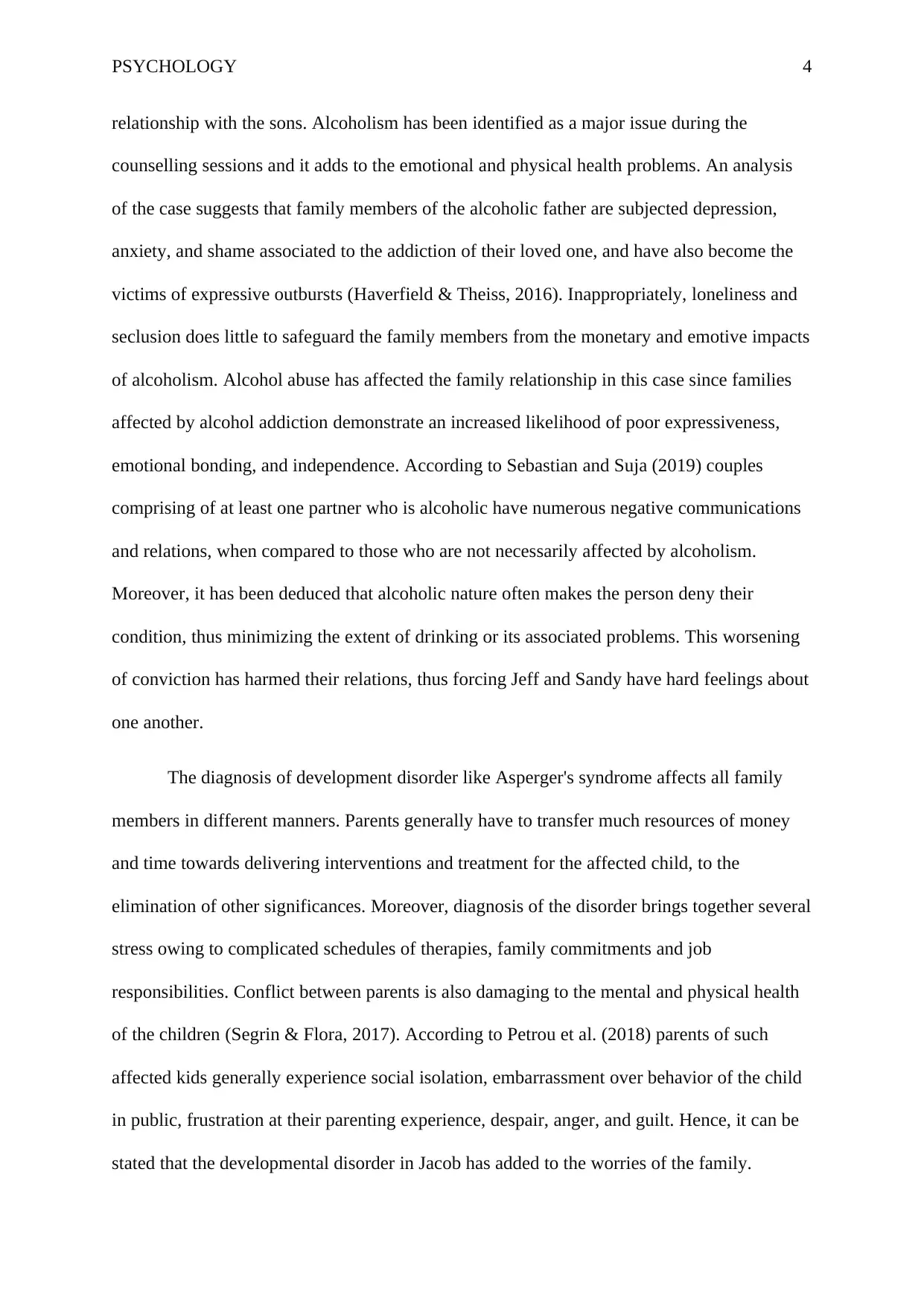
PSYCHOLOGY 4
relationship with the sons. Alcoholism has been identified as a major issue during the
counselling sessions and it adds to the emotional and physical health problems. An analysis
of the case suggests that family members of the alcoholic father are subjected depression,
anxiety, and shame associated to the addiction of their loved one, and have also become the
victims of expressive outbursts (Haverfield & Theiss, 2016). Inappropriately, loneliness and
seclusion does little to safeguard the family members from the monetary and emotive impacts
of alcoholism. Alcohol abuse has affected the family relationship in this case since families
affected by alcohol addiction demonstrate an increased likelihood of poor expressiveness,
emotional bonding, and independence. According to Sebastian and Suja (2019) couples
comprising of at least one partner who is alcoholic have numerous negative communications
and relations, when compared to those who are not necessarily affected by alcoholism.
Moreover, it has been deduced that alcoholic nature often makes the person deny their
condition, thus minimizing the extent of drinking or its associated problems. This worsening
of conviction has harmed their relations, thus forcing Jeff and Sandy have hard feelings about
one another.
The diagnosis of development disorder like Asperger's syndrome affects all family
members in different manners. Parents generally have to transfer much resources of money
and time towards delivering interventions and treatment for the affected child, to the
elimination of other significances. Moreover, diagnosis of the disorder brings together several
stress owing to complicated schedules of therapies, family commitments and job
responsibilities. Conflict between parents is also damaging to the mental and physical health
of the children (Segrin & Flora, 2017). According to Petrou et al. (2018) parents of such
affected kids generally experience social isolation, embarrassment over behavior of the child
in public, frustration at their parenting experience, despair, anger, and guilt. Hence, it can be
stated that the developmental disorder in Jacob has added to the worries of the family.
relationship with the sons. Alcoholism has been identified as a major issue during the
counselling sessions and it adds to the emotional and physical health problems. An analysis
of the case suggests that family members of the alcoholic father are subjected depression,
anxiety, and shame associated to the addiction of their loved one, and have also become the
victims of expressive outbursts (Haverfield & Theiss, 2016). Inappropriately, loneliness and
seclusion does little to safeguard the family members from the monetary and emotive impacts
of alcoholism. Alcohol abuse has affected the family relationship in this case since families
affected by alcohol addiction demonstrate an increased likelihood of poor expressiveness,
emotional bonding, and independence. According to Sebastian and Suja (2019) couples
comprising of at least one partner who is alcoholic have numerous negative communications
and relations, when compared to those who are not necessarily affected by alcoholism.
Moreover, it has been deduced that alcoholic nature often makes the person deny their
condition, thus minimizing the extent of drinking or its associated problems. This worsening
of conviction has harmed their relations, thus forcing Jeff and Sandy have hard feelings about
one another.
The diagnosis of development disorder like Asperger's syndrome affects all family
members in different manners. Parents generally have to transfer much resources of money
and time towards delivering interventions and treatment for the affected child, to the
elimination of other significances. Moreover, diagnosis of the disorder brings together several
stress owing to complicated schedules of therapies, family commitments and job
responsibilities. Conflict between parents is also damaging to the mental and physical health
of the children (Segrin & Flora, 2017). According to Petrou et al. (2018) parents of such
affected kids generally experience social isolation, embarrassment over behavior of the child
in public, frustration at their parenting experience, despair, anger, and guilt. Hence, it can be
stated that the developmental disorder in Jacob has added to the worries of the family.
Paraphrase This Document
Need a fresh take? Get an instant paraphrase of this document with our AI Paraphraser
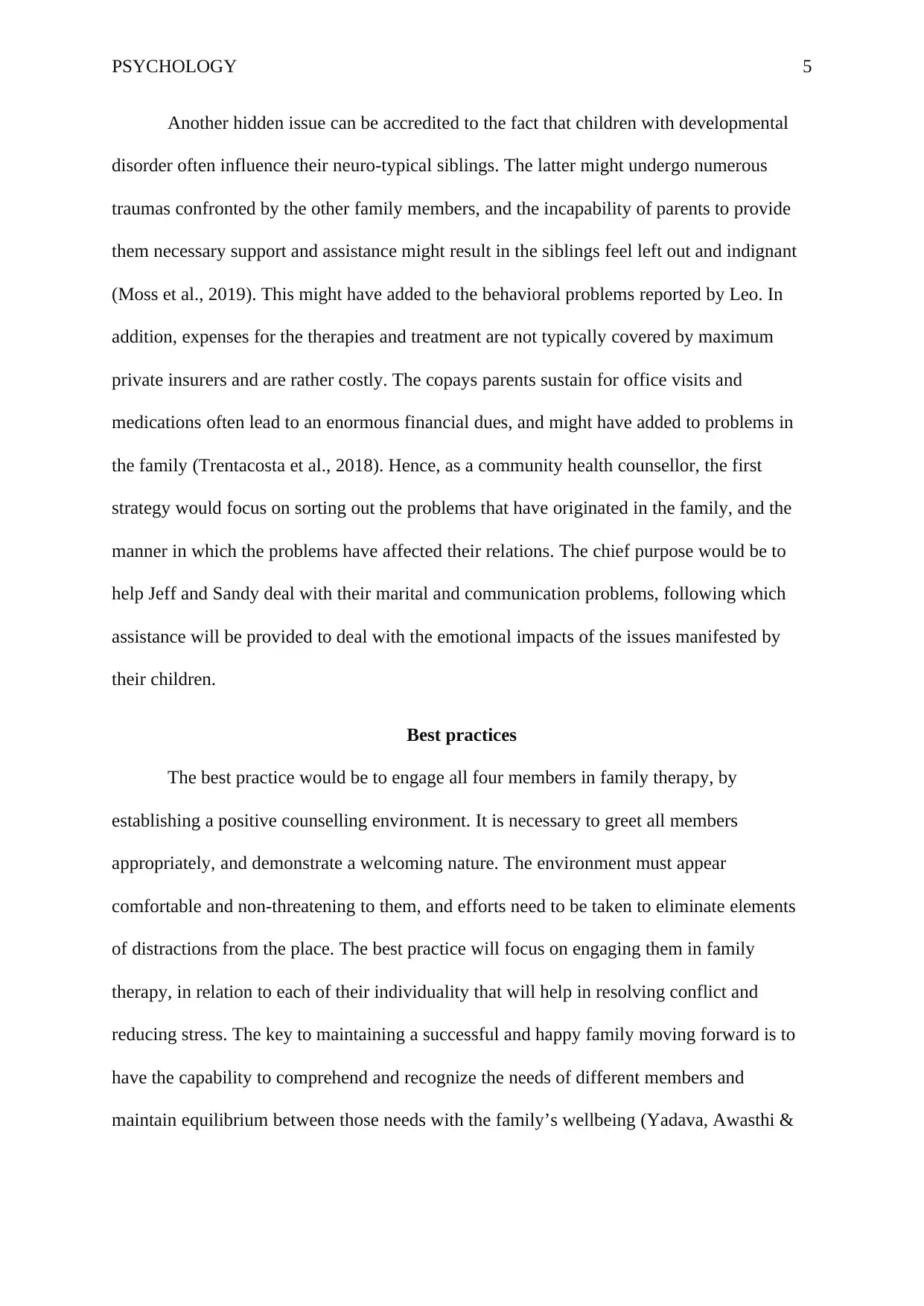
PSYCHOLOGY 5
Another hidden issue can be accredited to the fact that children with developmental
disorder often influence their neuro-typical siblings. The latter might undergo numerous
traumas confronted by the other family members, and the incapability of parents to provide
them necessary support and assistance might result in the siblings feel left out and indignant
(Moss et al., 2019). This might have added to the behavioral problems reported by Leo. In
addition, expenses for the therapies and treatment are not typically covered by maximum
private insurers and are rather costly. The copays parents sustain for office visits and
medications often lead to an enormous financial dues, and might have added to problems in
the family (Trentacosta et al., 2018). Hence, as a community health counsellor, the first
strategy would focus on sorting out the problems that have originated in the family, and the
manner in which the problems have affected their relations. The chief purpose would be to
help Jeff and Sandy deal with their marital and communication problems, following which
assistance will be provided to deal with the emotional impacts of the issues manifested by
their children.
Best practices
The best practice would be to engage all four members in family therapy, by
establishing a positive counselling environment. It is necessary to greet all members
appropriately, and demonstrate a welcoming nature. The environment must appear
comfortable and non-threatening to them, and efforts need to be taken to eliminate elements
of distractions from the place. The best practice will focus on engaging them in family
therapy, in relation to each of their individuality that will help in resolving conflict and
reducing stress. The key to maintaining a successful and happy family moving forward is to
have the capability to comprehend and recognize the needs of different members and
maintain equilibrium between those needs with the family’s wellbeing (Yadava, Awasthi &
Another hidden issue can be accredited to the fact that children with developmental
disorder often influence their neuro-typical siblings. The latter might undergo numerous
traumas confronted by the other family members, and the incapability of parents to provide
them necessary support and assistance might result in the siblings feel left out and indignant
(Moss et al., 2019). This might have added to the behavioral problems reported by Leo. In
addition, expenses for the therapies and treatment are not typically covered by maximum
private insurers and are rather costly. The copays parents sustain for office visits and
medications often lead to an enormous financial dues, and might have added to problems in
the family (Trentacosta et al., 2018). Hence, as a community health counsellor, the first
strategy would focus on sorting out the problems that have originated in the family, and the
manner in which the problems have affected their relations. The chief purpose would be to
help Jeff and Sandy deal with their marital and communication problems, following which
assistance will be provided to deal with the emotional impacts of the issues manifested by
their children.
Best practices
The best practice would be to engage all four members in family therapy, by
establishing a positive counselling environment. It is necessary to greet all members
appropriately, and demonstrate a welcoming nature. The environment must appear
comfortable and non-threatening to them, and efforts need to be taken to eliminate elements
of distractions from the place. The best practice will focus on engaging them in family
therapy, in relation to each of their individuality that will help in resolving conflict and
reducing stress. The key to maintaining a successful and happy family moving forward is to
have the capability to comprehend and recognize the needs of different members and
maintain equilibrium between those needs with the family’s wellbeing (Yadava, Awasthi &
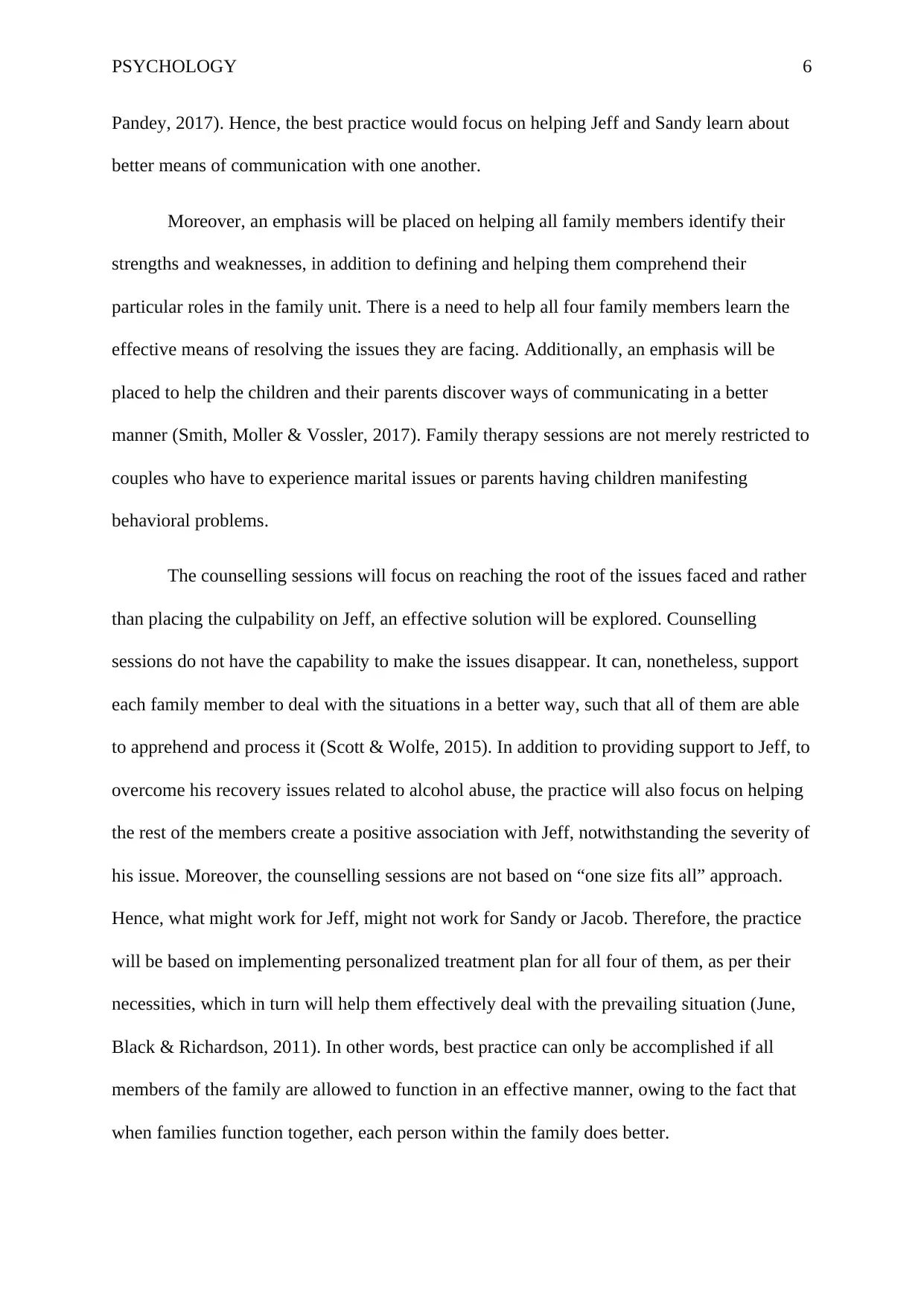
PSYCHOLOGY 6
Pandey, 2017). Hence, the best practice would focus on helping Jeff and Sandy learn about
better means of communication with one another.
Moreover, an emphasis will be placed on helping all family members identify their
strengths and weaknesses, in addition to defining and helping them comprehend their
particular roles in the family unit. There is a need to help all four family members learn the
effective means of resolving the issues they are facing. Additionally, an emphasis will be
placed to help the children and their parents discover ways of communicating in a better
manner (Smith, Moller & Vossler, 2017). Family therapy sessions are not merely restricted to
couples who have to experience marital issues or parents having children manifesting
behavioral problems.
The counselling sessions will focus on reaching the root of the issues faced and rather
than placing the culpability on Jeff, an effective solution will be explored. Counselling
sessions do not have the capability to make the issues disappear. It can, nonetheless, support
each family member to deal with the situations in a better way, such that all of them are able
to apprehend and process it (Scott & Wolfe, 2015). In addition to providing support to Jeff, to
overcome his recovery issues related to alcohol abuse, the practice will also focus on helping
the rest of the members create a positive association with Jeff, notwithstanding the severity of
his issue. Moreover, the counselling sessions are not based on “one size fits all” approach.
Hence, what might work for Jeff, might not work for Sandy or Jacob. Therefore, the practice
will be based on implementing personalized treatment plan for all four of them, as per their
necessities, which in turn will help them effectively deal with the prevailing situation (June,
Black & Richardson, 2011). In other words, best practice can only be accomplished if all
members of the family are allowed to function in an effective manner, owing to the fact that
when families function together, each person within the family does better.
Pandey, 2017). Hence, the best practice would focus on helping Jeff and Sandy learn about
better means of communication with one another.
Moreover, an emphasis will be placed on helping all family members identify their
strengths and weaknesses, in addition to defining and helping them comprehend their
particular roles in the family unit. There is a need to help all four family members learn the
effective means of resolving the issues they are facing. Additionally, an emphasis will be
placed to help the children and their parents discover ways of communicating in a better
manner (Smith, Moller & Vossler, 2017). Family therapy sessions are not merely restricted to
couples who have to experience marital issues or parents having children manifesting
behavioral problems.
The counselling sessions will focus on reaching the root of the issues faced and rather
than placing the culpability on Jeff, an effective solution will be explored. Counselling
sessions do not have the capability to make the issues disappear. It can, nonetheless, support
each family member to deal with the situations in a better way, such that all of them are able
to apprehend and process it (Scott & Wolfe, 2015). In addition to providing support to Jeff, to
overcome his recovery issues related to alcohol abuse, the practice will also focus on helping
the rest of the members create a positive association with Jeff, notwithstanding the severity of
his issue. Moreover, the counselling sessions are not based on “one size fits all” approach.
Hence, what might work for Jeff, might not work for Sandy or Jacob. Therefore, the practice
will be based on implementing personalized treatment plan for all four of them, as per their
necessities, which in turn will help them effectively deal with the prevailing situation (June,
Black & Richardson, 2011). In other words, best practice can only be accomplished if all
members of the family are allowed to function in an effective manner, owing to the fact that
when families function together, each person within the family does better.
⊘ This is a preview!⊘
Do you want full access?
Subscribe today to unlock all pages.

Trusted by 1+ million students worldwide
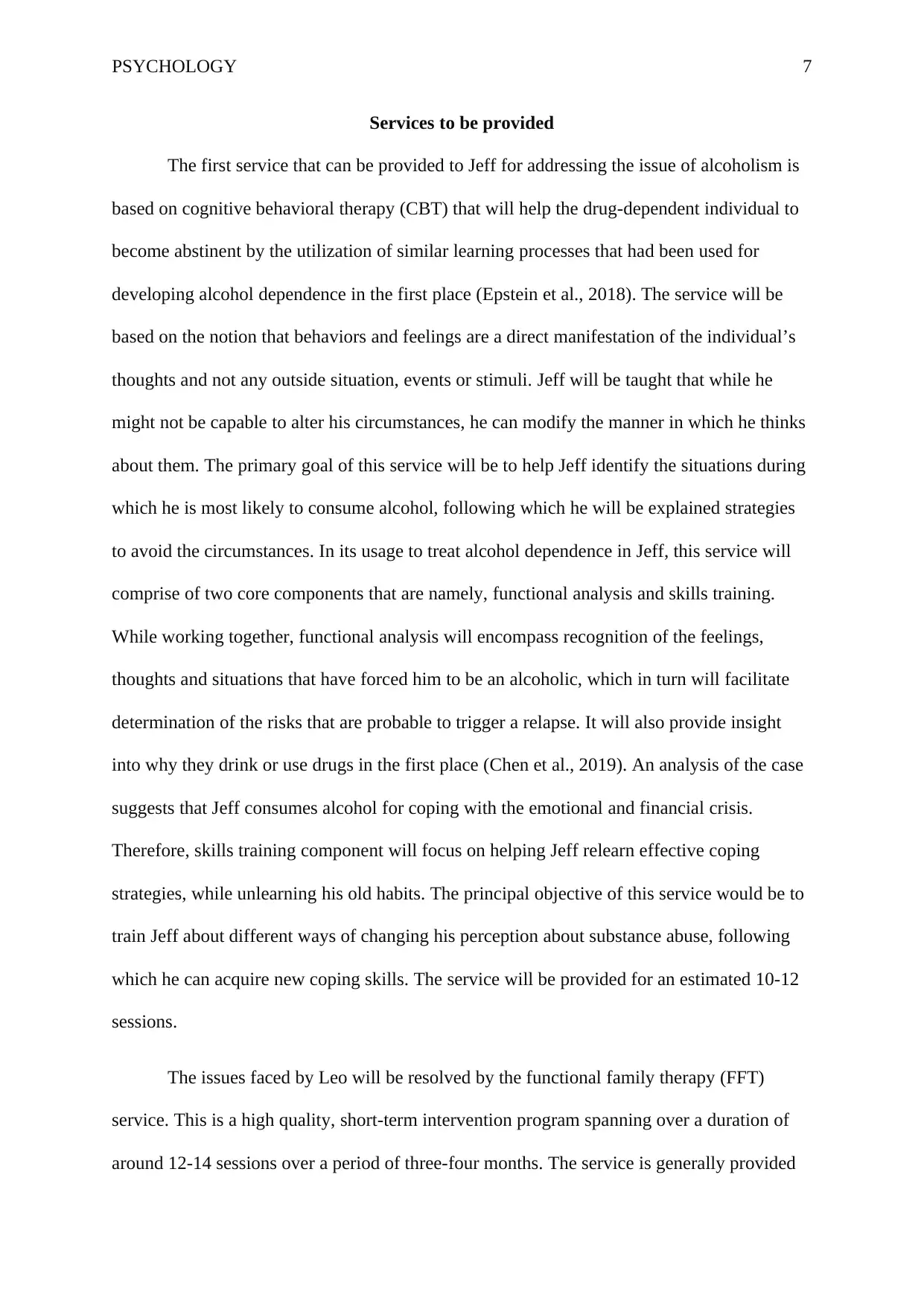
PSYCHOLOGY 7
Services to be provided
The first service that can be provided to Jeff for addressing the issue of alcoholism is
based on cognitive behavioral therapy (CBT) that will help the drug-dependent individual to
become abstinent by the utilization of similar learning processes that had been used for
developing alcohol dependence in the first place (Epstein et al., 2018). The service will be
based on the notion that behaviors and feelings are a direct manifestation of the individual’s
thoughts and not any outside situation, events or stimuli. Jeff will be taught that while he
might not be capable to alter his circumstances, he can modify the manner in which he thinks
about them. The primary goal of this service will be to help Jeff identify the situations during
which he is most likely to consume alcohol, following which he will be explained strategies
to avoid the circumstances. In its usage to treat alcohol dependence in Jeff, this service will
comprise of two core components that are namely, functional analysis and skills training.
While working together, functional analysis will encompass recognition of the feelings,
thoughts and situations that have forced him to be an alcoholic, which in turn will facilitate
determination of the risks that are probable to trigger a relapse. It will also provide insight
into why they drink or use drugs in the first place (Chen et al., 2019). An analysis of the case
suggests that Jeff consumes alcohol for coping with the emotional and financial crisis.
Therefore, skills training component will focus on helping Jeff relearn effective coping
strategies, while unlearning his old habits. The principal objective of this service would be to
train Jeff about different ways of changing his perception about substance abuse, following
which he can acquire new coping skills. The service will be provided for an estimated 10-12
sessions.
The issues faced by Leo will be resolved by the functional family therapy (FFT)
service. This is a high quality, short-term intervention program spanning over a duration of
around 12-14 sessions over a period of three-four months. The service is generally provided
Services to be provided
The first service that can be provided to Jeff for addressing the issue of alcoholism is
based on cognitive behavioral therapy (CBT) that will help the drug-dependent individual to
become abstinent by the utilization of similar learning processes that had been used for
developing alcohol dependence in the first place (Epstein et al., 2018). The service will be
based on the notion that behaviors and feelings are a direct manifestation of the individual’s
thoughts and not any outside situation, events or stimuli. Jeff will be taught that while he
might not be capable to alter his circumstances, he can modify the manner in which he thinks
about them. The primary goal of this service will be to help Jeff identify the situations during
which he is most likely to consume alcohol, following which he will be explained strategies
to avoid the circumstances. In its usage to treat alcohol dependence in Jeff, this service will
comprise of two core components that are namely, functional analysis and skills training.
While working together, functional analysis will encompass recognition of the feelings,
thoughts and situations that have forced him to be an alcoholic, which in turn will facilitate
determination of the risks that are probable to trigger a relapse. It will also provide insight
into why they drink or use drugs in the first place (Chen et al., 2019). An analysis of the case
suggests that Jeff consumes alcohol for coping with the emotional and financial crisis.
Therefore, skills training component will focus on helping Jeff relearn effective coping
strategies, while unlearning his old habits. The principal objective of this service would be to
train Jeff about different ways of changing his perception about substance abuse, following
which he can acquire new coping skills. The service will be provided for an estimated 10-12
sessions.
The issues faced by Leo will be resolved by the functional family therapy (FFT)
service. This is a high quality, short-term intervention program spanning over a duration of
around 12-14 sessions over a period of three-four months. The service is generally provided
Paraphrase This Document
Need a fresh take? Get an instant paraphrase of this document with our AI Paraphraser
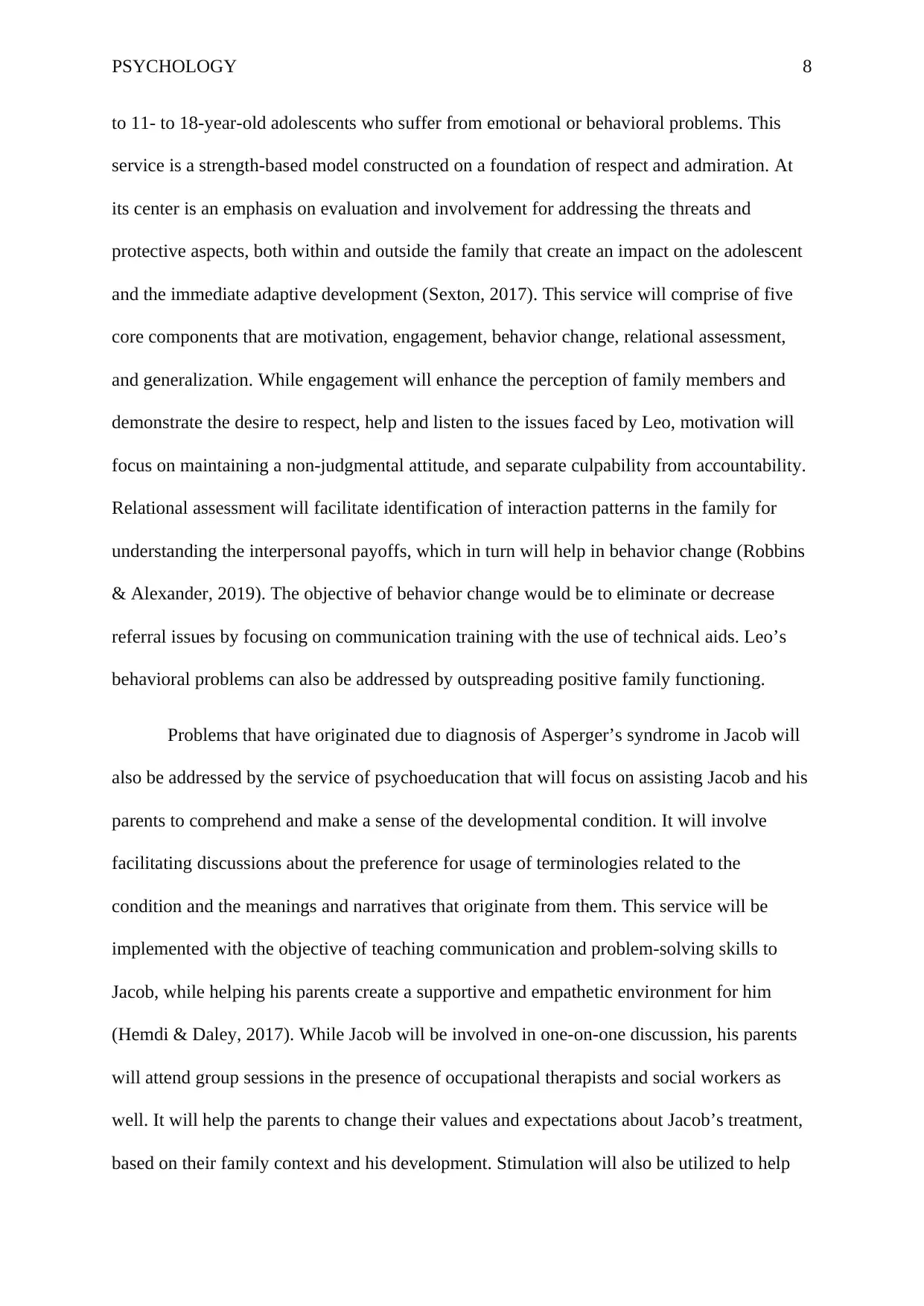
PSYCHOLOGY 8
to 11- to 18-year-old adolescents who suffer from emotional or behavioral problems. This
service is a strength-based model constructed on a foundation of respect and admiration. At
its center is an emphasis on evaluation and involvement for addressing the threats and
protective aspects, both within and outside the family that create an impact on the adolescent
and the immediate adaptive development (Sexton, 2017). This service will comprise of five
core components that are motivation, engagement, behavior change, relational assessment,
and generalization. While engagement will enhance the perception of family members and
demonstrate the desire to respect, help and listen to the issues faced by Leo, motivation will
focus on maintaining a non-judgmental attitude, and separate culpability from accountability.
Relational assessment will facilitate identification of interaction patterns in the family for
understanding the interpersonal payoffs, which in turn will help in behavior change (Robbins
& Alexander, 2019). The objective of behavior change would be to eliminate or decrease
referral issues by focusing on communication training with the use of technical aids. Leo’s
behavioral problems can also be addressed by outspreading positive family functioning.
Problems that have originated due to diagnosis of Asperger’s syndrome in Jacob will
also be addressed by the service of psychoeducation that will focus on assisting Jacob and his
parents to comprehend and make a sense of the developmental condition. It will involve
facilitating discussions about the preference for usage of terminologies related to the
condition and the meanings and narratives that originate from them. This service will be
implemented with the objective of teaching communication and problem-solving skills to
Jacob, while helping his parents create a supportive and empathetic environment for him
(Hemdi & Daley, 2017). While Jacob will be involved in one-on-one discussion, his parents
will attend group sessions in the presence of occupational therapists and social workers as
well. It will help the parents to change their values and expectations about Jacob’s treatment,
based on their family context and his development. Stimulation will also be utilized to help
to 11- to 18-year-old adolescents who suffer from emotional or behavioral problems. This
service is a strength-based model constructed on a foundation of respect and admiration. At
its center is an emphasis on evaluation and involvement for addressing the threats and
protective aspects, both within and outside the family that create an impact on the adolescent
and the immediate adaptive development (Sexton, 2017). This service will comprise of five
core components that are motivation, engagement, behavior change, relational assessment,
and generalization. While engagement will enhance the perception of family members and
demonstrate the desire to respect, help and listen to the issues faced by Leo, motivation will
focus on maintaining a non-judgmental attitude, and separate culpability from accountability.
Relational assessment will facilitate identification of interaction patterns in the family for
understanding the interpersonal payoffs, which in turn will help in behavior change (Robbins
& Alexander, 2019). The objective of behavior change would be to eliminate or decrease
referral issues by focusing on communication training with the use of technical aids. Leo’s
behavioral problems can also be addressed by outspreading positive family functioning.
Problems that have originated due to diagnosis of Asperger’s syndrome in Jacob will
also be addressed by the service of psychoeducation that will focus on assisting Jacob and his
parents to comprehend and make a sense of the developmental condition. It will involve
facilitating discussions about the preference for usage of terminologies related to the
condition and the meanings and narratives that originate from them. This service will be
implemented with the objective of teaching communication and problem-solving skills to
Jacob, while helping his parents create a supportive and empathetic environment for him
(Hemdi & Daley, 2017). While Jacob will be involved in one-on-one discussion, his parents
will attend group sessions in the presence of occupational therapists and social workers as
well. It will help the parents to change their values and expectations about Jacob’s treatment,
based on their family context and his development. Stimulation will also be utilized to help
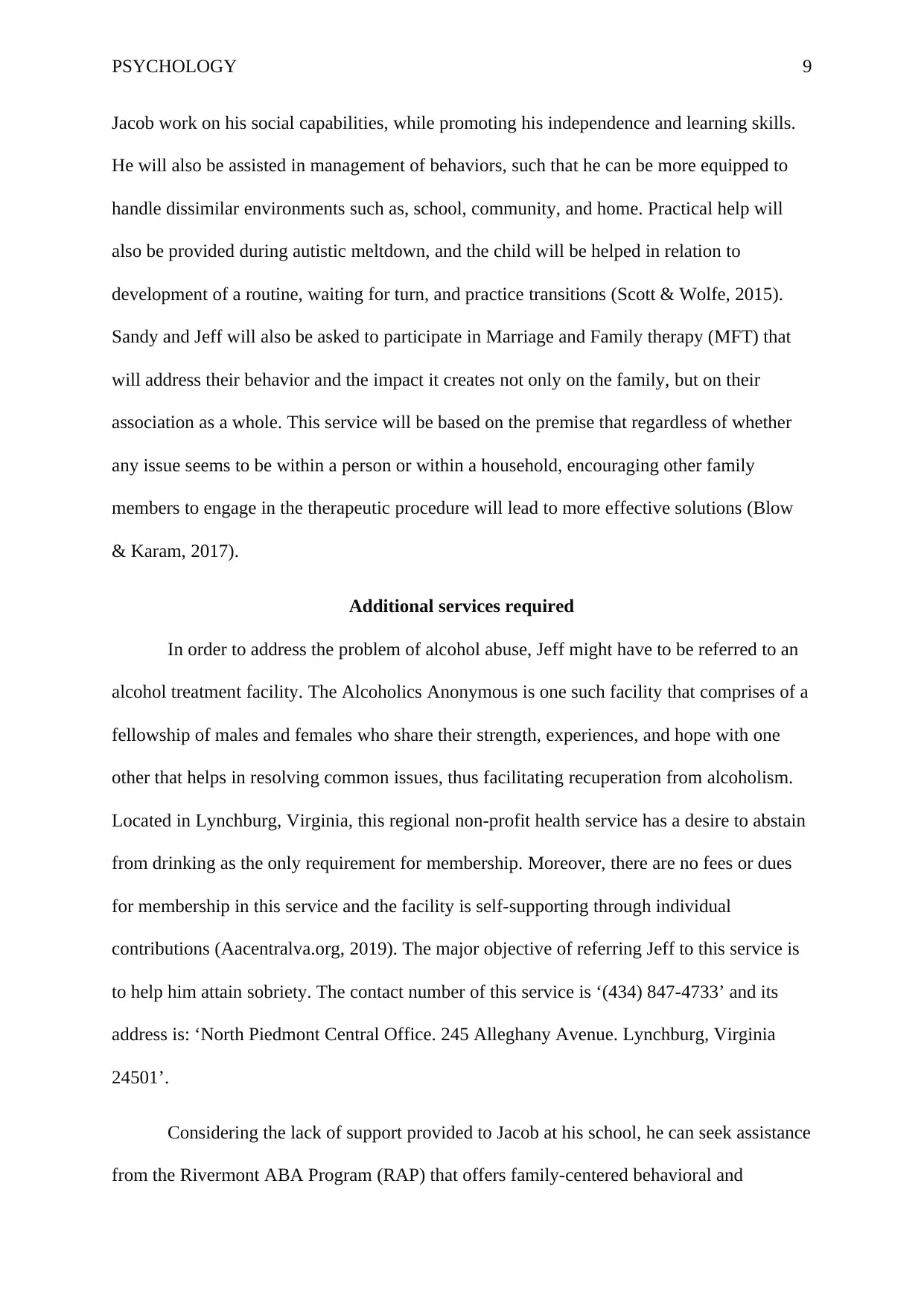
PSYCHOLOGY 9
Jacob work on his social capabilities, while promoting his independence and learning skills.
He will also be assisted in management of behaviors, such that he can be more equipped to
handle dissimilar environments such as, school, community, and home. Practical help will
also be provided during autistic meltdown, and the child will be helped in relation to
development of a routine, waiting for turn, and practice transitions (Scott & Wolfe, 2015).
Sandy and Jeff will also be asked to participate in Marriage and Family therapy (MFT) that
will address their behavior and the impact it creates not only on the family, but on their
association as a whole. This service will be based on the premise that regardless of whether
any issue seems to be within a person or within a household, encouraging other family
members to engage in the therapeutic procedure will lead to more effective solutions (Blow
& Karam, 2017).
Additional services required
In order to address the problem of alcohol abuse, Jeff might have to be referred to an
alcohol treatment facility. The Alcoholics Anonymous is one such facility that comprises of a
fellowship of males and females who share their strength, experiences, and hope with one
other that helps in resolving common issues, thus facilitating recuperation from alcoholism.
Located in Lynchburg, Virginia, this regional non-profit health service has a desire to abstain
from drinking as the only requirement for membership. Moreover, there are no fees or dues
for membership in this service and the facility is self-supporting through individual
contributions (Aacentralva.org, 2019). The major objective of referring Jeff to this service is
to help him attain sobriety. The contact number of this service is ‘(434) 847-4733’ and its
address is: ‘North Piedmont Central Office. 245 Alleghany Avenue. Lynchburg, Virginia
24501’.
Considering the lack of support provided to Jacob at his school, he can seek assistance
from the Rivermont ABA Program (RAP) that offers family-centered behavioral and
Jacob work on his social capabilities, while promoting his independence and learning skills.
He will also be assisted in management of behaviors, such that he can be more equipped to
handle dissimilar environments such as, school, community, and home. Practical help will
also be provided during autistic meltdown, and the child will be helped in relation to
development of a routine, waiting for turn, and practice transitions (Scott & Wolfe, 2015).
Sandy and Jeff will also be asked to participate in Marriage and Family therapy (MFT) that
will address their behavior and the impact it creates not only on the family, but on their
association as a whole. This service will be based on the premise that regardless of whether
any issue seems to be within a person or within a household, encouraging other family
members to engage in the therapeutic procedure will lead to more effective solutions (Blow
& Karam, 2017).
Additional services required
In order to address the problem of alcohol abuse, Jeff might have to be referred to an
alcohol treatment facility. The Alcoholics Anonymous is one such facility that comprises of a
fellowship of males and females who share their strength, experiences, and hope with one
other that helps in resolving common issues, thus facilitating recuperation from alcoholism.
Located in Lynchburg, Virginia, this regional non-profit health service has a desire to abstain
from drinking as the only requirement for membership. Moreover, there are no fees or dues
for membership in this service and the facility is self-supporting through individual
contributions (Aacentralva.org, 2019). The major objective of referring Jeff to this service is
to help him attain sobriety. The contact number of this service is ‘(434) 847-4733’ and its
address is: ‘North Piedmont Central Office. 245 Alleghany Avenue. Lynchburg, Virginia
24501’.
Considering the lack of support provided to Jacob at his school, he can seek assistance
from the Rivermont ABA Program (RAP) that offers family-centered behavioral and
⊘ This is a preview!⊘
Do you want full access?
Subscribe today to unlock all pages.

Trusted by 1+ million students worldwide
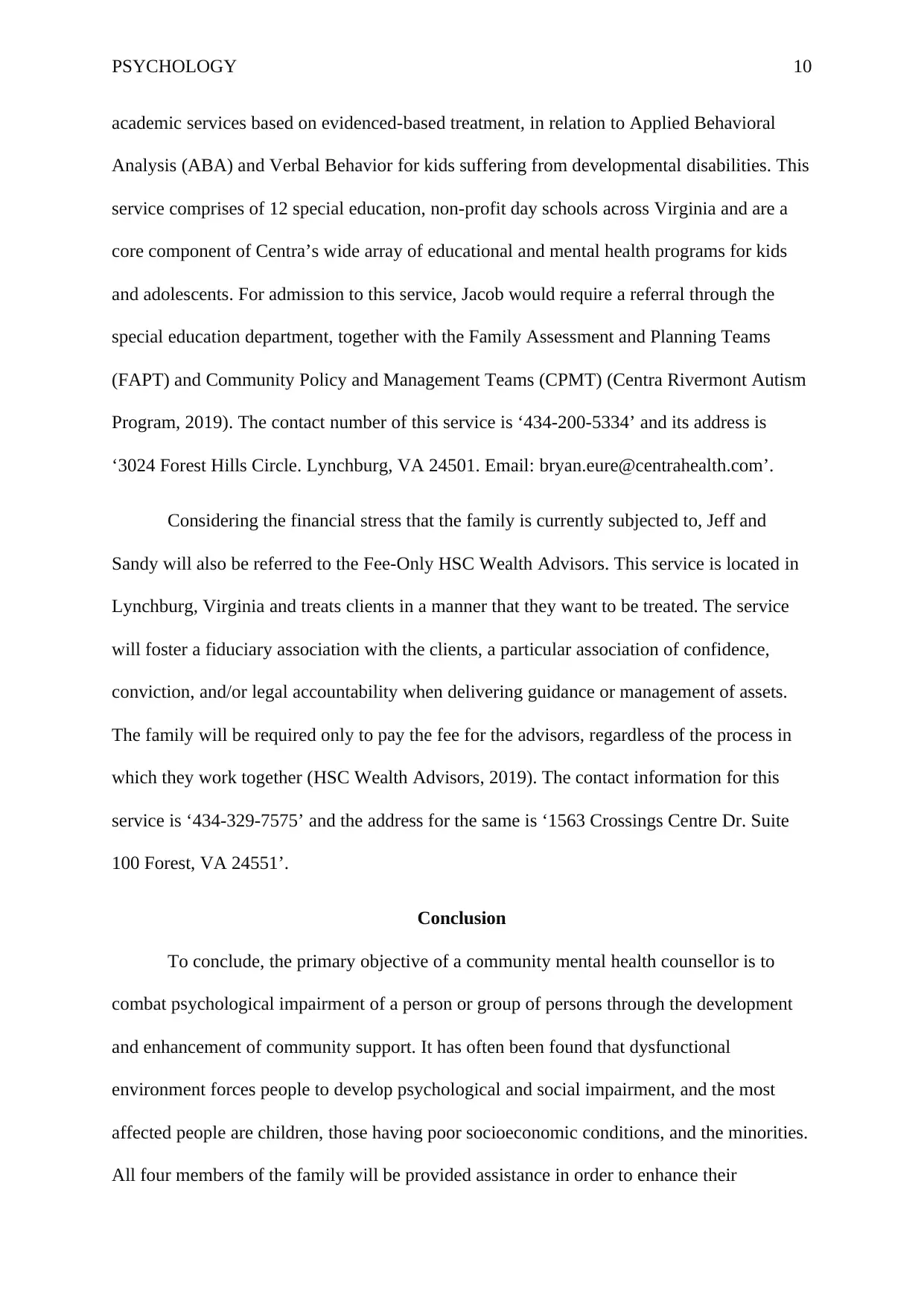
PSYCHOLOGY 10
academic services based on evidenced-based treatment, in relation to Applied Behavioral
Analysis (ABA) and Verbal Behavior for kids suffering from developmental disabilities. This
service comprises of 12 special education, non-profit day schools across Virginia and are a
core component of Centra’s wide array of educational and mental health programs for kids
and adolescents. For admission to this service, Jacob would require a referral through the
special education department, together with the Family Assessment and Planning Teams
(FAPT) and Community Policy and Management Teams (CPMT) (Centra Rivermont Autism
Program, 2019). The contact number of this service is ‘434-200-5334’ and its address is
‘3024 Forest Hills Circle. Lynchburg, VA 24501. Email: bryan.eure@centrahealth.com’.
Considering the financial stress that the family is currently subjected to, Jeff and
Sandy will also be referred to the Fee-Only HSC Wealth Advisors. This service is located in
Lynchburg, Virginia and treats clients in a manner that they want to be treated. The service
will foster a fiduciary association with the clients, a particular association of confidence,
conviction, and/or legal accountability when delivering guidance or management of assets.
The family will be required only to pay the fee for the advisors, regardless of the process in
which they work together (HSC Wealth Advisors, 2019). The contact information for this
service is ‘434-329-7575’ and the address for the same is ‘1563 Crossings Centre Dr. Suite
100 Forest, VA 24551’.
Conclusion
To conclude, the primary objective of a community mental health counsellor is to
combat psychological impairment of a person or group of persons through the development
and enhancement of community support. It has often been found that dysfunctional
environment forces people to develop psychological and social impairment, and the most
affected people are children, those having poor socioeconomic conditions, and the minorities.
All four members of the family will be provided assistance in order to enhance their
academic services based on evidenced-based treatment, in relation to Applied Behavioral
Analysis (ABA) and Verbal Behavior for kids suffering from developmental disabilities. This
service comprises of 12 special education, non-profit day schools across Virginia and are a
core component of Centra’s wide array of educational and mental health programs for kids
and adolescents. For admission to this service, Jacob would require a referral through the
special education department, together with the Family Assessment and Planning Teams
(FAPT) and Community Policy and Management Teams (CPMT) (Centra Rivermont Autism
Program, 2019). The contact number of this service is ‘434-200-5334’ and its address is
‘3024 Forest Hills Circle. Lynchburg, VA 24501. Email: bryan.eure@centrahealth.com’.
Considering the financial stress that the family is currently subjected to, Jeff and
Sandy will also be referred to the Fee-Only HSC Wealth Advisors. This service is located in
Lynchburg, Virginia and treats clients in a manner that they want to be treated. The service
will foster a fiduciary association with the clients, a particular association of confidence,
conviction, and/or legal accountability when delivering guidance or management of assets.
The family will be required only to pay the fee for the advisors, regardless of the process in
which they work together (HSC Wealth Advisors, 2019). The contact information for this
service is ‘434-329-7575’ and the address for the same is ‘1563 Crossings Centre Dr. Suite
100 Forest, VA 24551’.
Conclusion
To conclude, the primary objective of a community mental health counsellor is to
combat psychological impairment of a person or group of persons through the development
and enhancement of community support. It has often been found that dysfunctional
environment forces people to develop psychological and social impairment, and the most
affected people are children, those having poor socioeconomic conditions, and the minorities.
All four members of the family will be provided assistance in order to enhance their
Paraphrase This Document
Need a fresh take? Get an instant paraphrase of this document with our AI Paraphraser

PSYCHOLOGY 11
communication, solve their family issues, handle and understand the particular family
situations, and develop an enhanced home environment.
communication, solve their family issues, handle and understand the particular family
situations, and develop an enhanced home environment.
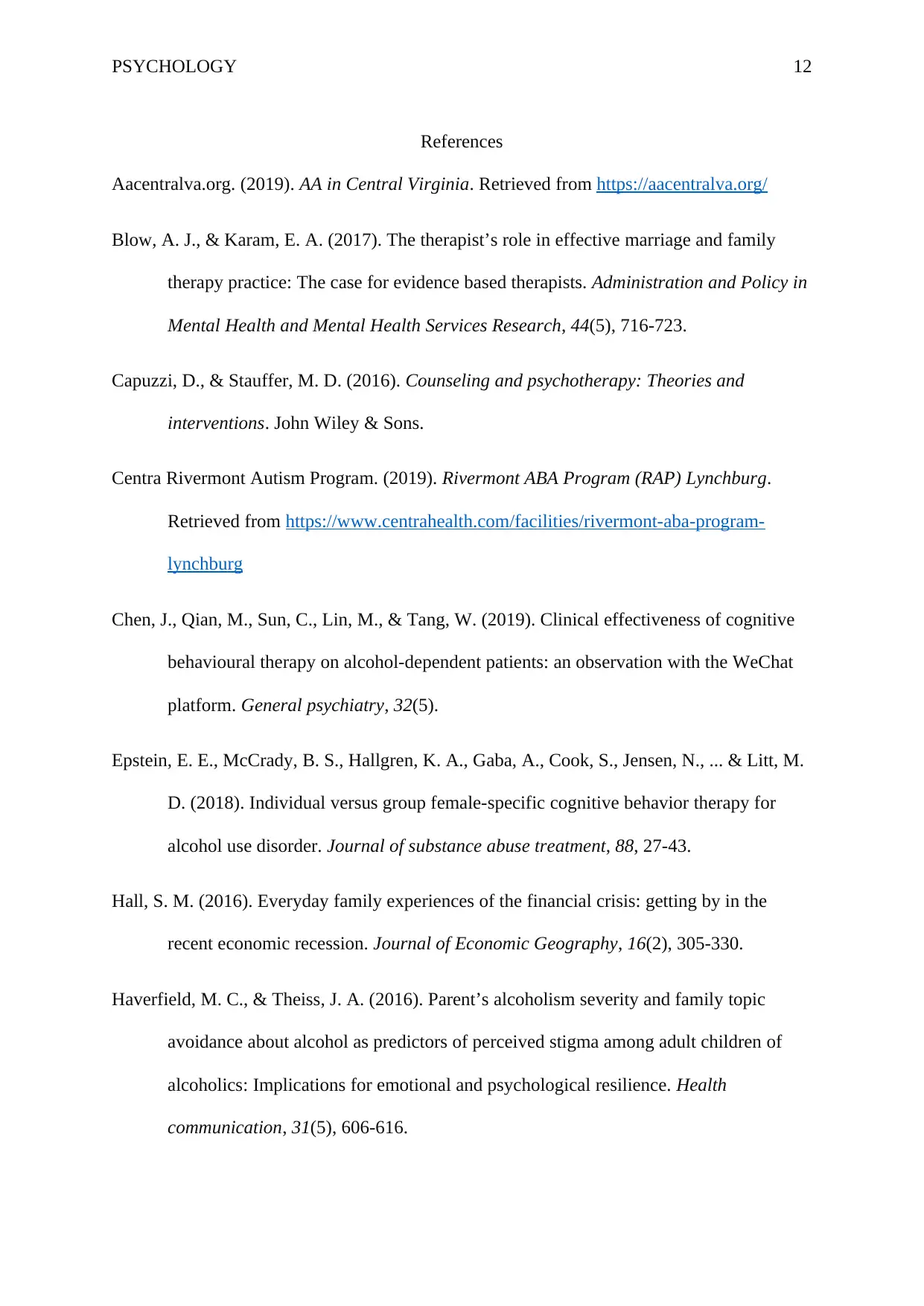
PSYCHOLOGY 12
References
Aacentralva.org. (2019). AA in Central Virginia. Retrieved from https://aacentralva.org/
Blow, A. J., & Karam, E. A. (2017). The therapist’s role in effective marriage and family
therapy practice: The case for evidence based therapists. Administration and Policy in
Mental Health and Mental Health Services Research, 44(5), 716-723.
Capuzzi, D., & Stauffer, M. D. (2016). Counseling and psychotherapy: Theories and
interventions. John Wiley & Sons.
Centra Rivermont Autism Program. (2019). Rivermont ABA Program (RAP) Lynchburg.
Retrieved from https://www.centrahealth.com/facilities/rivermont-aba-program-
lynchburg
Chen, J., Qian, M., Sun, C., Lin, M., & Tang, W. (2019). Clinical effectiveness of cognitive
behavioural therapy on alcohol-dependent patients: an observation with the WeChat
platform. General psychiatry, 32(5).
Epstein, E. E., McCrady, B. S., Hallgren, K. A., Gaba, A., Cook, S., Jensen, N., ... & Litt, M.
D. (2018). Individual versus group female-specific cognitive behavior therapy for
alcohol use disorder. Journal of substance abuse treatment, 88, 27-43.
Hall, S. M. (2016). Everyday family experiences of the financial crisis: getting by in the
recent economic recession. Journal of Economic Geography, 16(2), 305-330.
Haverfield, M. C., & Theiss, J. A. (2016). Parent’s alcoholism severity and family topic
avoidance about alcohol as predictors of perceived stigma among adult children of
alcoholics: Implications for emotional and psychological resilience. Health
communication, 31(5), 606-616.
References
Aacentralva.org. (2019). AA in Central Virginia. Retrieved from https://aacentralva.org/
Blow, A. J., & Karam, E. A. (2017). The therapist’s role in effective marriage and family
therapy practice: The case for evidence based therapists. Administration and Policy in
Mental Health and Mental Health Services Research, 44(5), 716-723.
Capuzzi, D., & Stauffer, M. D. (2016). Counseling and psychotherapy: Theories and
interventions. John Wiley & Sons.
Centra Rivermont Autism Program. (2019). Rivermont ABA Program (RAP) Lynchburg.
Retrieved from https://www.centrahealth.com/facilities/rivermont-aba-program-
lynchburg
Chen, J., Qian, M., Sun, C., Lin, M., & Tang, W. (2019). Clinical effectiveness of cognitive
behavioural therapy on alcohol-dependent patients: an observation with the WeChat
platform. General psychiatry, 32(5).
Epstein, E. E., McCrady, B. S., Hallgren, K. A., Gaba, A., Cook, S., Jensen, N., ... & Litt, M.
D. (2018). Individual versus group female-specific cognitive behavior therapy for
alcohol use disorder. Journal of substance abuse treatment, 88, 27-43.
Hall, S. M. (2016). Everyday family experiences of the financial crisis: getting by in the
recent economic recession. Journal of Economic Geography, 16(2), 305-330.
Haverfield, M. C., & Theiss, J. A. (2016). Parent’s alcoholism severity and family topic
avoidance about alcohol as predictors of perceived stigma among adult children of
alcoholics: Implications for emotional and psychological resilience. Health
communication, 31(5), 606-616.
⊘ This is a preview!⊘
Do you want full access?
Subscribe today to unlock all pages.

Trusted by 1+ million students worldwide
1 out of 14
Your All-in-One AI-Powered Toolkit for Academic Success.
+13062052269
info@desklib.com
Available 24*7 on WhatsApp / Email
![[object Object]](/_next/static/media/star-bottom.7253800d.svg)
Unlock your academic potential
Copyright © 2020–2026 A2Z Services. All Rights Reserved. Developed and managed by ZUCOL.